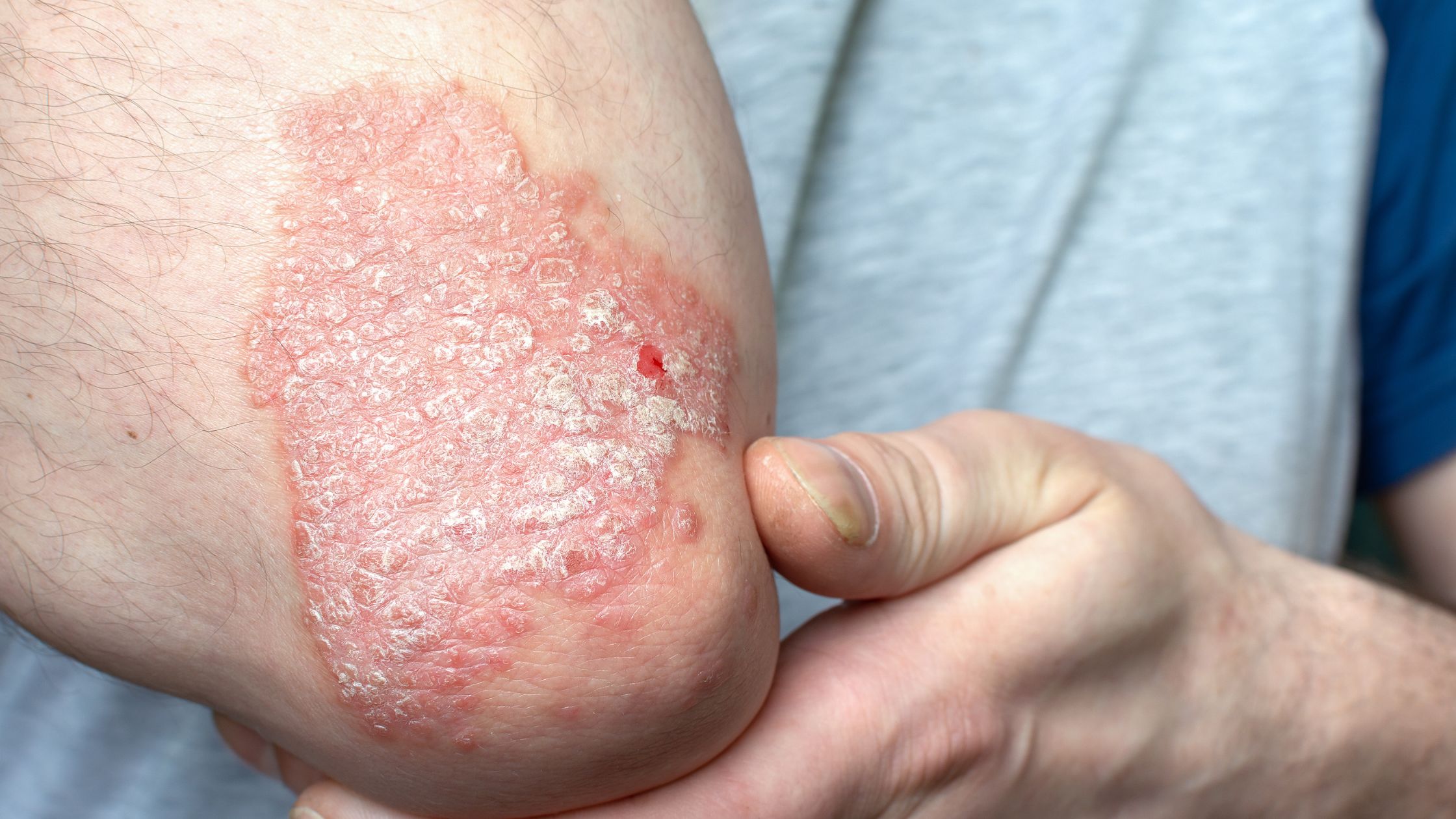What Is Psoriatic Arthritis?
Psoriatic arthritis is a chronic autoimmune condition that causes joint pain, stiffness, and swelling in individuals with psoriasis. It commonly affects the knees, ankles, spine, and fingers and may lead to psoriatic spondylitis or enthesitis—inflammation where tendons and ligaments attach to bones.
If left untreated, psoriatic arthritis can cause permanent joint damage, mobility issues, and even impact the eyes (uveitis), causing pain and sensitivity to light.
What Are the Symptoms of Psoriatic Arthritis?
Common psoriatic arthritis symptoms include:
Joint pain, stiffness, and swelling, especially in fingers and toes
Skin psoriasis: red, scaly patches
Nail changes: pitting, ridging, or separation
Fatigue and sleep disruption
Eye inflammation (uveitis)
Spinal pain and stiffness (psoriatic spondylitis)
Enthesitis (heel, elbow, or foot pain)
Fluctuating symptom severity
Early signs of psoriatic arthritis may involve joint stiffness in the morning, swelling in small joints, or nail issues before a formal diagnosis.
What Causes Psoriatic Arthritis?
Wondering what causes psoriatic arthritis? It occurs when the immune system mistakenly attacks healthy tissue, particularly joints and skin. Triggers may include:
People with psoriasis are at higher risk, but not everyone with psoriasis will develop arthritis.
Psoriatic Arthritis Diagnosis and When to Seek Help
How Do You Get Diagnosed With Psoriatic Arthritis?
Diagnosis is based on physical exams, symptom history, lab tests, and imaging studies. If you have psoriasis and notice joint symptoms, contact Portland Wellness Care for a professional evaluation. Early diagnosis can help prevent long-term joint damage.
Psoriatic Arthritis Treatment Options at Portland Wellness Care
Medical and Holistic Psoriatic Arthritis Treatments
At Portland Wellness Care, we treat both the physical pain and autoimmune inflammation associated with psoriatic arthritis. Our options include:
For those asking “can chiropractic care help psoriatic arthritis?” — chiropractic treatments may support spinal alignment and reduce pain, particularly for neck and lower back discomfort.
Medications for Psoriatic Arthritis
Common psoriatic arthritis medications include:
NSAIDs (e.g., ibuprofen)
Corticosteroids for short-term relief
DMARDs (e.g., methotrexate)
Biologics (e.g., TNF or IL-17 inhibitors)
JAK inhibitors for immune modulation
Topical creams for psoriasis flare-ups
A combination of these may be used depending on symptom severity and disease progression.
Lifestyle Changes and Pain Management Techniques
Lifestyle adjustments that can support psoriatic arthritis recovery:
Physical Therapy and Exercise for Symptom Relief
Exercise helps ease pain of psoriatic arthritis, especially when supervised by physical therapists. Benefits include:
Massage therapy and routine stretching can support psoriatic arthritis pain relief, especially for those with shoulder pain, knee arthritis, or neck symptoms.
Alternative Therapies for Psoriatic Arthritis
Complementary treatments can enhance your wellness plan. Options may include:
Tai Chi and yoga
Meditation
Massage for psoriatic arthritis
Acupuncture for inflammation and pain
Avoiding environmental triggers
Can Psoriatic Arthritis Cause Fatigue?
Yes. Fatigue and joint pain in psoriasis are common. Chronic inflammation not only disrupts sleep but can also affect mental clarity and daily energy levels. Inflammation-related fatigue is one of the most underrecognized symptoms of psoriatic arthritis.
What Are the Long-Term Effects of Psoriatic Arthritis?
Without treatment, the long-term effects of psoriatic arthritis can include:
Permanent joint damage
Joint fusion or bone erosion
Reduced range of motion
Chronic inflammation in the eyes
Mobility issues and disability
Early and ongoing care can slow progression and help patients maintain a high quality of life.
Can Psoriatic Arthritis Be Prevented?
While psoriatic arthritis cannot be prevented, proactive treatment of psoriasis and reducing known triggers (like infections and skin injuries) may lower the risk. Early signs of joint involvement should prompt immediate care.
What Does Psoriatic Arthritis Look Like on the Skin?
If you’re wondering what does psoriatic arthritis look like, look for:
Red, raised, and flaky patches of skin
Thick, ridged, or discolored nails
Swollen fingers or toes (“sausage digits”)
Skin symptoms may appear before or alongside joint symptoms.
FAQs: Psoriatic Arthritis
Q: What’s the difference between psoriasis and psoriatic arthritis?
A: Psoriasis affects the skin, while psoriatic arthritis affects joints. Many patients have both.
Q: Can psoriatic arthritis affect the neck?
A: Yes. Neck pain and stiffness may occur due to inflammation in the cervical spine.
Q: Is massage good for psoriatic arthritis?
A: Yes, medical massage may help reduce pain, improve circulation, and enhance mobility.
Final Thought
Living with psoriatic arthritis can be overwhelming, but with the right combination of medical treatment, physical therapy, and holistic care, it’s possible to manage symptoms and reclaim your quality of life. At Portland Wellness Care, we take a comprehensive, patient-centered approach—helping you reduce pain, improve mobility, and prevent long-term joint damage. Whether you’re newly diagnosed or looking for better symptom control, our team is here to support your journey to wellness every step of the way. Don’t wait—early intervention makes all the difference.






